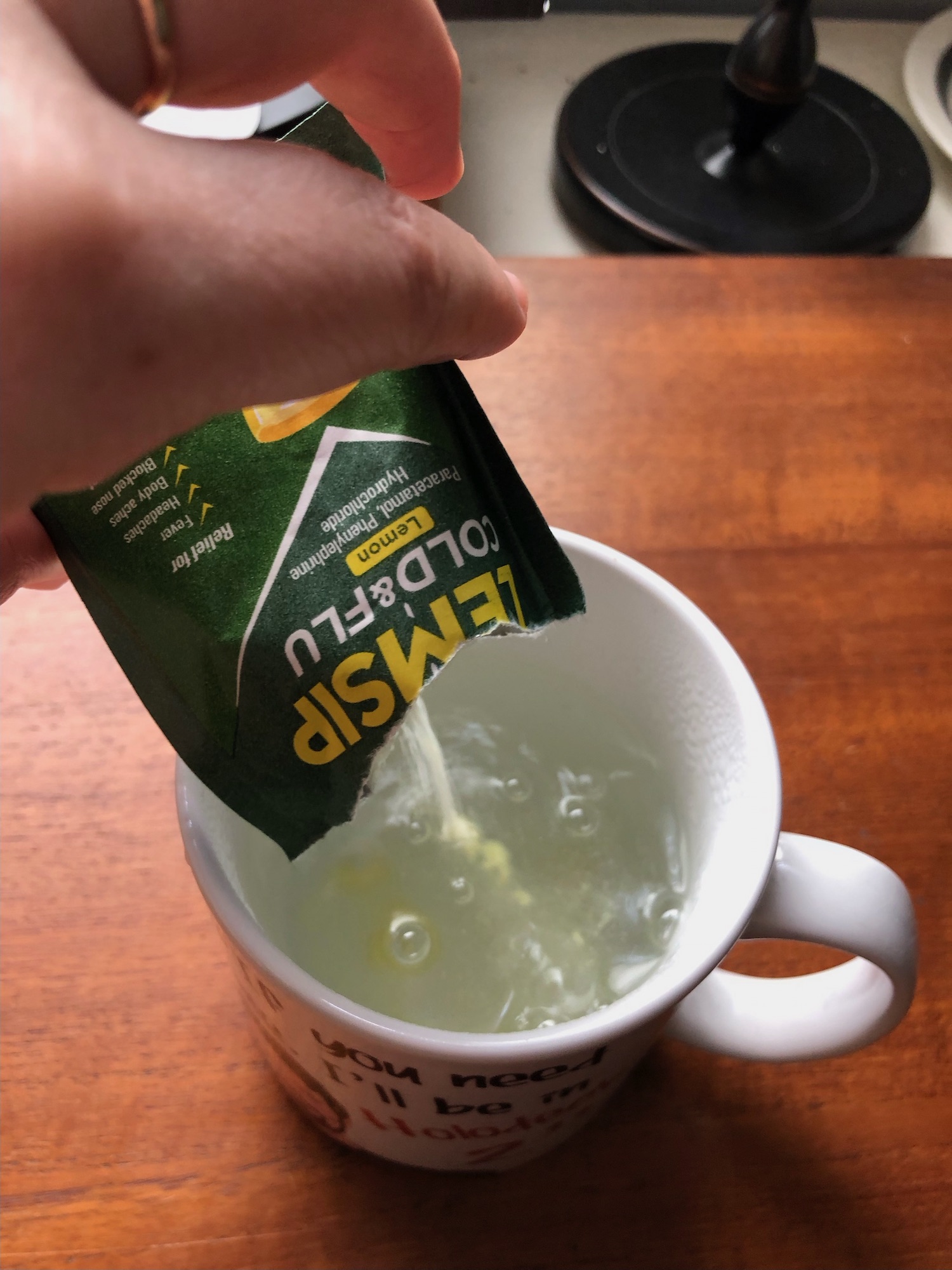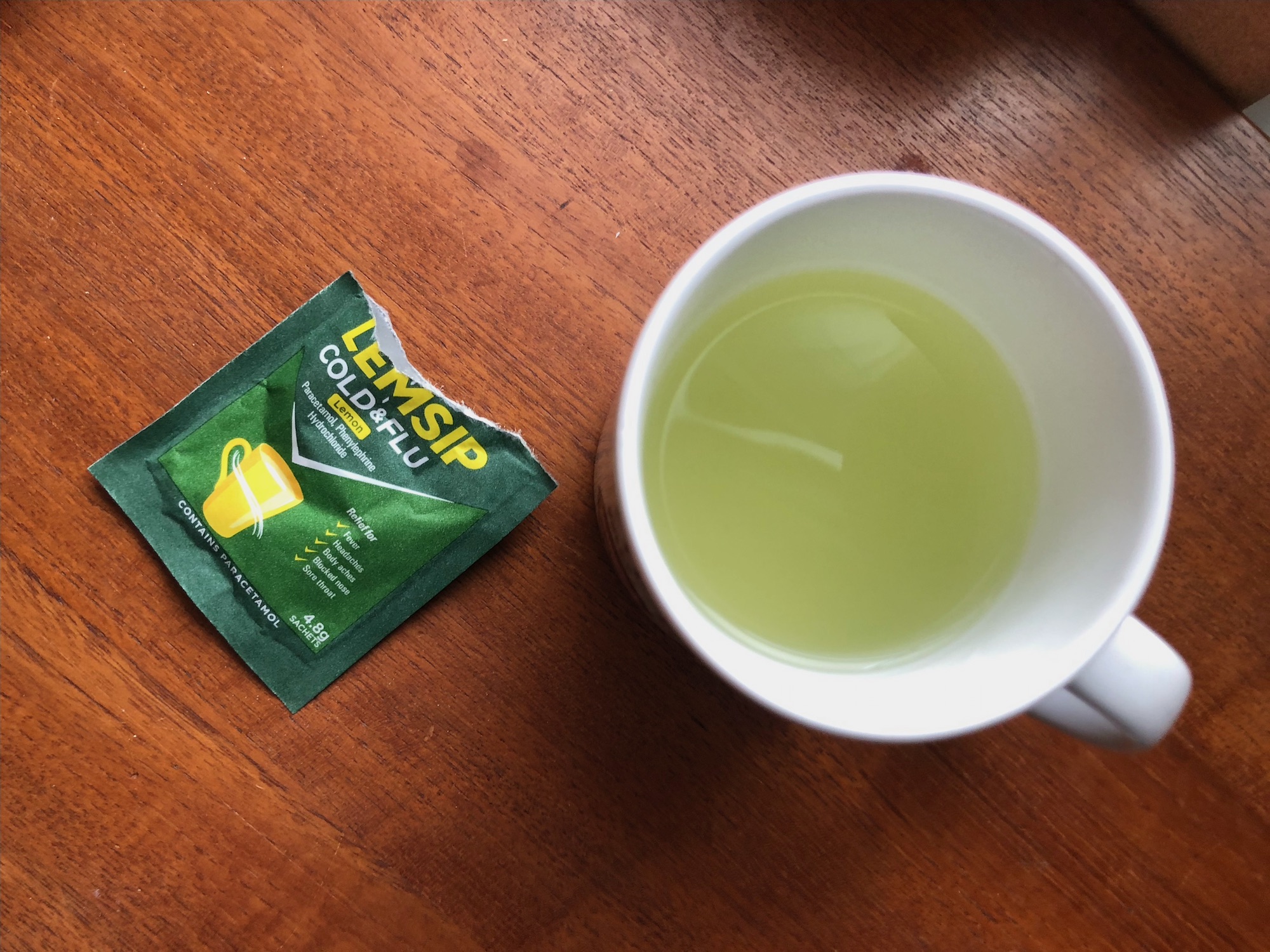Is it nostalgia? Or a desire to suffer? Because it’s definitely not the taste. A Scandinavian weighs in on the quirky yellow powder that is Lemsip.
When I got my British citizenship nearly two years ago, in a mandatory ceremony in front of a giant Union Jack and a portrait of the Queen, I thought I’d got to grips with this country. I’ve lived here long enough to say sorry for things that aren’t my fault. I love talking about the weather. But there are some things you simply have to start from childhood to understand. One of those things is Lemsip.
Lemsip, the cold and flu remedy you mix with hot water and drink, came into my life like it does for many foreigners — by dating a native Brit. It’s a sobering experience: you come to the country that built an empire and expect them to know how to do things, only to one day encounter one of their countrymen or women sniffling in bed, nursing a mug reeking of fake flavouring and artificial sweetener. They will lie there and proudly, nasally, claim this is the cure for the common cold.
Suggestions to just take some pills with a cup of tea are not welcome, I’ve learned. But after some research, I now accept that Lemsip is more than the sum of its parts. Brits are raised on Lemsip, and nostalgia is extremely powerful. And also, there’s stoicism in suffering before getting your reward, which is a core British trait.
“I suppose on balance it’s not a nice flavour, but it’s very well associated with feeling better,” says Tom, my ex who loves Lemsip so much he takes it on holiday. “You don’t necessarily feel better because of the medicine, but because you have the hot lemony drink in your hands.”

Norwegian Jessica has always been baffled by Brits’ fondness for the fake lemony taste of Lemsip
Kate’s words are even stronger: “Lemsip is soothing and self-flagellating in equal measures,” she laughs. “It’s an acquired taste — it’s bitter and medicinal, and it almost feels like I’m suffering through it to get to health on the other side, like some sort of restorative potion.”
Nicola doesn’t hold any punches: “I think people mostly hate it, but they like to suffer! I find it both disgusting and ineffective, but it’s kind of the only thing you feel you can do.”
This country’s devotion to Lemsip crystallised in the frenzied first months of the pandemic when Vice declared: “In times of toil and hardship, we rely on the things that never let us down: family, friends, Lemsip and Peep Show.” Lockdown stockpiling resulted in a Lemsip shortage which has resurfaced every winter since — when things get tough, it seems, the tough like to sip their medicine.
But what exactly is Lemsip?
Lemsip contains paracetamol for pain relief and phenylephrine to help with sinus congestion, and the “Max All-in-One” also has guaifenesin to clear your chest. You can ask the pharmacist to get you the special Lemsip with pseudoephedrine from behind the counter — this is a more powerful sinus unblocker which used to be standard, but as it can also be used to make meth, it’s now restricted. Breaking Bad prevention aside, this is unfortunate because studies suggest phenylephrine may be no more effective than a placebo when treating congestion.
Lemsip also comes in capsules, syrup and a nasal spray, but the drink seems to be the more popular version — reports of shortages often point to “only capsules” left. Asked if drinking versus swallowing your cold medicine makes a difference, Abbas Kanani, a pharmacist at UK online pharmacy Chemist Click, says not really: “Powder is more rapidly absorbed by the body than a supplement contained in pill form. Hot drink remedies can also offer comfort and hydration. But in the grand scheme of things, no.”
Die-hard fans of Lemsip in a cup should carry on, though — the placebo effect is real. “The ritual of taking medication [can] have a positive effect,” says Kanani. “The placebo effect won’t make the virus go away any quicker, but can work on symptoms by believing that a [treatment] is working.”

Jez kindly offering to take bring Mark his mug of Lemsip in bed.
Kate loves a Lemsip so much she’ll break her veganism for it — it contains lactose — even though she thinks pills work just as well. “There’s definitely something far more comforting about the format of Lemsip and hugging a cup of it. It just makes you feel more loved and nurtured than knocking back a pill,” she says. But Gavin takes it to the next level: “There was a period, just after I had covid, when I was doing a Lemsip in the morning with my coffee. Separate cups. It’s a good hangover cure too, it clears the pipes.”
Lemsip’s parent company, Reckitt Benckiser, did not respond to requests for comment, but their website informs us that “LEM-SIP” first saw the light of day in 1969 in Norwich. Originally made with real lemon, this innovation was “not only effective but tasted great too”, and Lemsip proceeded to capture the country’s hearts through its stuffy noses.
Kate remembers being given her first Lemsip by her dad: “I actually have a special Lemsip mug. I realise now that I picked it from the memory of my dad giving me Lemsip in a similar mug, white china as well,” she laughs. “To be handed a nice hot steaming mug of Lemsip feels like an extra step of care, and you don’t get that from being handed some paracetamol. In that way, taking a moment to make yourself a Lemsip is an extra step of self care.”
For Dan, a big part of the Lemsip experience is the flavour. “I’m not convinced it’s the best thing for a cold, but I do really like the taste of it!” When I tell him I’m about to have my first Lemsip, he recommends the Original flavour, not the Max — the taste isn’t right. Dutifully, I purchased a box of Lemsip Original, and I swear I had a good attitude, but as the smell from my cup rapidly drifted from lemon sherbet to lemon Toilet Duck, the game was pretty much over. Dan’s description of a “weird fake lemon flavour” is accurate, although I found the artificial sweetener domineering, egged on by the taste of the medicine underneath.
I managed two sips before I poured it out and went to get some paracetamol and make a cup of tea. I really don’t want to piss on anyone’s chips, but without the nostalgia element, Lemsip is a deranged ritual. But I’m genuinely glad that people who enjoy Lemsip feel comforted by it in times of need — that has real value. Shine on, you weird-fake-lemon crazy diamond.





